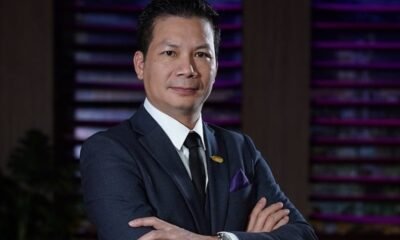Business
I Was Laid Off From My Tech Job — Now I’m Pursuing a Career in Welding

This as-told-to essay is based on a conversation with Tabby Toney, a 37-year-old former software engineer in Oklahoma, about leaving tech for a blue-collar career. It’s been edited for length and clarity.
My path into software engineering wasn’t direct. I followed a friend into tech and started doing manual testing, knowing nothing; I was just doing user experience work. I self-studied, paid for virtual classes, and bugged all of my software engineer friends until I could get a job as a software engineer.
I loved tech because of the intellectual stimulation it provided. I enjoyed the creative problem-solving and critical thinking required to make things happen. That part has been taken away with the industry pushing AI.
Last year, I started thinking about a transition out of tech. I was having recurring moments of frustration, and all my friends were having the same issues.
I was laid off in May. At first, I thought I’d just take a month off because I was already so burned out. But I don’t sit still very well, so I decided to take up welding.
Layoffs have forced me to figure out what to do next
I had a feeling I was going to get laid off due to the industry’s direction with AI, so I was hoarding all my extra money in preparation.
I didn’t want to start over again, but I also didn’t want to be bored. I needed something to keep me engaged and feeling like I was contributing, but my tech job didn’t do that anymore.
Like me, I have friends who are completely leaving the tech industry right now. If tech isn’t your whole life, it’s OK if you want to move on. Now it’s a little easier to make the jump. With how often the layoffs are, I feel less like I’m leaving something stable and steady.
I got frustrated with the reliance on AI when it’s not ready yet
There’s a lot of talk now, like, “Are you just mad because AI is taking your job?” That’s not it.
I haven’t lost a job to AI. I think the problem is the industry’s reliance on AI when it’s not ready yet. Also, a lot of decisions are being made by non-tech people who don’t fully understand how it affects the people who are writing the tech.
I started feeling the shift affect me in October of last year, but I didn’t want to leave the industry because tech has always excited me.
Software engineer interviews are typically very intense
I dreaded the coming interview process if I were to continue looking for software engineering roles. You have to drop everything for two months and study for these assessments, which are like studying for the ACT.
I couldn’t stand the thought of dropping everything and studying all over again for the interview, so I decided to take a month off, and I haven’t looked back.
Welding was a natural option for me
How I picked up welding after getting laid off was pretty random. I took welding in high school, and I remember running around as a kid in my grandpa’s garage, where he and my dad did it a bunch.
I thought of it as something you do to repair things around your house or farm. But I borrowed some of my family’s equipment and tried it again during my month break.
I enjoy it because it’s creative. However, metallurgy also involves knowing what to use and how to do it in certain situations, so there’s still a thinking aspect to it. I also like working with my hands.
I’m thankful I have enough money saved to get through welding school, and I don’t think I’ll return to tech
I’m doing some side jobs for some friends right now, but I’m not at a level of welding yet that I would feel comfortable applying for a job in the field until I at least finish one class, which I start in August.
Tech years are like dog years with how fast stuff changes and new inventions, but if we rely on AI to do so much, it almost feels like you’re going backward in your skills, unless you’re the person creating the AI.
I’ve forgotten things that I previously knew how to do just because I hadn’t done them in so long, and I’ve heard other people say the same thing. The market and the job industry didn’t have to go this way because we could’ve used AI as a supplement. It’s great as a helper.
With how the industry is now, I’m pretty happy with my decision. I thought I would be a nervous wreck forever, but I was ready. I feel so relieved now that I have left tech and have a new plan.
Do you have a career change or layoff story to share? Contact this reporter, Agnes Applegate, at aapplegate@businessinsider.com.
Business
Gold price hits record high as investors seek safety

The price of gold has hit a record high as demand for the precious metal remains strong amid global economic uncertainty.
The spot gold price hit $3,508.50 per ounce early on Tuesday, continuing its upwards trend which has seen it rise by nearly a third this year.
The precious metal is viewed as a safer asset for investors during times of economic uncertainty, and its price rose earlier this year after US President Donald Trump announced wide ranging tariffs which have upset global trade.
Analysts say the price has also been lifted by expectations that the US central bank will cut its key interest rate, making gold an even more attractive prospect for investors.
Adrian Ash, director of research at BullionVault, told the BBC’s Today programme that the rise in gold prices over the past few months is really down to Trump and “what he’s done to geopolitics [and] what he’s done to global trade”.
“It was really the US election last year that really put a fire under it,” he said.
Analysts also cite worries over the independence of the US central bank, the Federal Reserve, as another factor driving the gold price.
Trump has launched repeated attacks on the Federal Reserve’s chair, Jerome Powell, and recently attempted to fire one of its governors, Lisa Cook.
Derren Nathan from Hargreaves Lansdown said it was Trump’s “attempts to undermine the independence of the Federal Reserve Bank” that was “driving renewed interest in safe haven assets including gold”.
On Monday, the head of the European Central Bank Christine Lagarde warned that if Trump were to undermine the independence of the Fed, it would represent a “very serious danger” to the global economy.
She said if the Fed was forced to respond to Trump’s politics, it would have a “very worrying” impact on economic stability in the US, and therefore in the rest of the world as well.
Mr Ash added that when the price of gold surges because of investor interest, it was usually tempered by a slowdown in buying from China and India – two of the biggest markets for gold jewellery.
But this time, he said gold was continuing to find demand in China and India as, rather than exiting the market during times of high prices, jewellery buyers turn towards buying investment gold products such as bars or coins.
Business
Trade, Energy, AI Dominate Kazakhstan–China Business Council

ASTANA — President Kassym-Jomart Tokayev described China as Kazakhstan’s destined neighbor, close friend, and long-term strategic partner during the Sept. 2 Eighth Meeting of the Kazakhstan–China Business Council in Beijing, Akorda press service reported.
Photo credit: Akorda
He noted that bilateral trade reached a record $44 billion last year, and emphasized the two countries’ intention to push this figure even higher over the next five years, backed by strong political will at the highest level. China has already invested $27 billion in Kazakhstan, with more than 6,000 Chinese-backed enterprises operating in the country, ranging from giants such as CNPC, Sinopec, CITIC, and Huawei to mid-sized businesses. Tokayev described his talks with President Xi Jinping as productive, voicing confidence in the partnership’s future.
He underlined Kazakhstan’s steady economic growth, with GDP expected to surpass $300 billion by year’s end. Reforms such as the National Digital Investment Platform, a new Investment Headquarters, and the recent bilateral investment protection agreement, coupled with a visa-free regime, have all strengthened the investment climate. Tokayev said Kazakhstan and China share vast untapped potential — and now is the time to unlock it.
Transport and logistics
Kazakhstan, as a close neighbor and reliable partner, fully supports and actively participates in President Xi Jinping’s Belt and Road Initiative, Tokayev said. The country accounts for 85% of all continental freight between China and Europe. The commissioning of the second track on the Dostyk–Mointy railway this year will increase the corridor’s transit capacity fivefold.
Meanwhile, freight volumes along the Trans-Caspian International Transport Route grew 62% last year to 4.5 million tons, with a target of 10 million tons in the near future. President Tokayev noted that shipments through Kazakhstan’s Caspian ports, specifically Aktau and Kuryk, are also growing steadily. Additionally, key joint infrastructure projects, such as the Kazakhstan–China logistics terminal in Lianyungang and the dry port in Xi’an, are already operational.
“For Chinese companies, Kazakhstan’s transit potential opens tremendous opportunities,” Tokayev said.
Energy and nuclear cooperation
Tokayev outlined major projects in the energy sector, including a $7.4 billion polyethylene plant in the Atyrau region with Sinopec and the planned modernization of the Shymkent oil refinery with CNPC. Renewable projects are also in focus, including initiatives with China Power International Holding and China Energy, as well as the construction of a 160 MW gas-steam power plant in Mangystau with China Huadian Corporation.
He added that Kazakhstan and China agreed to expand cooperation in the nuclear industry, involving Chinese technologies and specialist training. CNNC will play a central role, while SANY Corporation continues to expand its presence in Kazakhstan’s energy market. Tokayev emphasized that traditional energy sources remain crucial to Kazakhstan’s security, but joint projects across the sector will strengthen the mutually beneficial partnership.
Large-scale mining and metallurgical projects with Chinese firms are underway, including Fujian Hengwang Investment’s steel plant in Zhambyl region (three million tons annual capacity) and Jiaxin International’s tungsten ore processing project in Almaty region.
In construction and manufacturing, Tokayev cited China Glass’s new glass plant, a forthcoming multi-brand auto plant in Almaty with a capacity of 120,000 vehicles annually, producing GWM, Chery, and Changan models, and a new BYD electric bus plant in the same city.
“These projects diversify Kazakhstan’s economy and expand its export-oriented base. These are only a few examples,” he said.
Adding momentum, Tokayev and Chinese Vice Premier Ding Xuexiang jointly inaugurated Kazakhstan’s first wind energy components plant in the Zhambyl region via videoconference. The facility, built through a partnership between Samruk-Kazyna and SANY Renewable Energy, will produce gondolas, hubs, towers, and other key components for wind farms, boosting Kazakhstan’s green energy capacity. Located in the Silk Road Special Economic Zone in Shu, it will play a vital role in expanding renewable energy across the country.
Agriculture and digital economy
Tokayev reminded that Kazakhstan is the world’s sixth-largest holder of arable land and a top-ten grain exporter, supplying over 10 million tons of wheat and 2 million tons of flour annually. He said Kazakhstan can supply up to 2 million tons of grain each year to China. Beyond exports, Kazakhstan seeks to develop joint processing industries, highlighting Dalian Group’s deep grain processing plant in Akmola region and Fufeng Group’s corn-processing project in Zhambyl region, aimed at exports to China and Europe. He also invited Chinese partners to cooperate in producing organic and high-quality livestock products.
On digitalization, Tokayev praised China’s global achievements in the field and cited forecasts that the AI market could reach $5 trillion by 2033, accounting for 30% of the global tech industry. He mentioned that at the Shanghai Cooperation Organization summit in Tianjin, he supported China’s initiative to establish a Global Organization for AI Cooperation. Kazakhstan, he added, is systematically developing its digital economy, having launched Central Asia’s first supercomputer and the Alem.AI International AI Center this year. The construction of Alatau City, envisioned as a hub for innovation, crypto, and tech entrepreneurship, is underway and will soon receive special ecosystem status.
Finance and investment
Tokayev also called for deepening cooperation in finance, noting that the Astana International Financial Centre now hosts over 4,200 companies from dozens of countries, including 850 from China. In partnership with leading Chinese banks, the Development Bank of Kazakhstan recently issued its debut eurobonds in Chinese yuan (Dim Sum bonds), a first for Central Asia, which strengthened international investor confidence in Kazakhstan’s financial system.
Tokayev emphasized that Kazakhstan has created the most favorable conditions for large-scale investments and ambitious projects. He assured Chinese business leaders that they will find reliable partners and unique opportunities in Kazakhstan.
“I am confident that the agreements reached today will boost economic interaction and give new momentum to our strategic partnership. These goals fully align with Kazakhstan’s national interests, which is why their implementation will remain under close attention of the top leadership,” he said.
The Kazakhstan–China Business Council concluded with the signing of over 70 commercial documents worth $15 billion.
Business
Zudu Doubles Headcount and Targets £10M Revenue as AI Demand Surges – standard-journal.com
-

 Business4 days ago
Business4 days agoThe Guardian view on Trump and the Fed: independence is no substitute for accountability | Editorial
-
Tools & Platforms3 weeks ago
Building Trust in Military AI Starts with Opening the Black Box – War on the Rocks
-

 Ethics & Policy1 month ago
Ethics & Policy1 month agoSDAIA Supports Saudi Arabia’s Leadership in Shaping Global AI Ethics, Policy, and Research – وكالة الأنباء السعودية
-

 Events & Conferences3 months ago
Events & Conferences3 months agoJourney to 1000 models: Scaling Instagram’s recommendation system
-

 Jobs & Careers2 months ago
Jobs & Careers2 months agoMumbai-based Perplexity Alternative Has 60k+ Users Without Funding
-

 Funding & Business2 months ago
Funding & Business2 months agoKayak and Expedia race to build AI travel agents that turn social posts into itineraries
-

 Education2 months ago
Education2 months agoVEX Robotics launches AI-powered classroom robotics system
-

 Podcasts & Talks2 months ago
Podcasts & Talks2 months agoHappy 4th of July! 🎆 Made with Veo 3 in Gemini
-

 Education2 months ago
Education2 months agoAERDF highlights the latest PreK-12 discoveries and inventions
-

 Podcasts & Talks2 months ago
Podcasts & Talks2 months agoOpenAI 🤝 @teamganassi





















